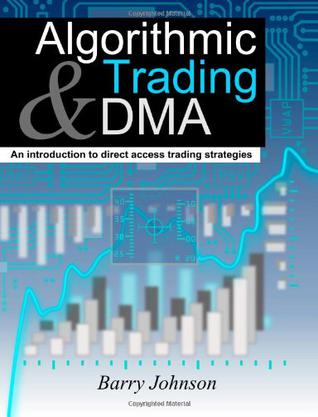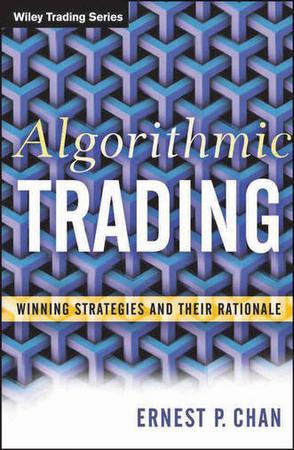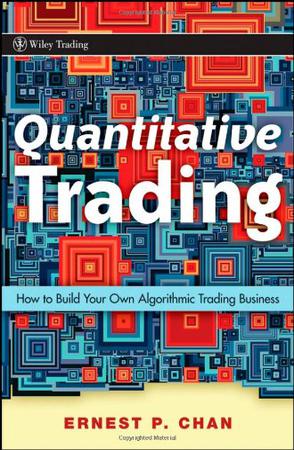-

Algorithmic Trading and DMA
Algorithmic trading and Direct Market Access (DMA) are important tools helping both buy and sell-side traders to achieve best execution. This book starts from the ground up to provide detailed explanations of both these techniques: - An introduction to the different types of execution is followed by a review of market microstructure theory. Throughout the book examples from empirical studies bridge the gap between the theory and practice of trading. - Orders are the fundamental building blocks for any strategy. Market, limit, stop, hidden, iceberg, peg, routed and immediate-or-cancel orders are all described with illustrated examples. - Trading algorithms are explained and compared using charts to show potential trading patterns. TWAP, VWAP, Percent of Volume, Minimal Impact, Implementation Shortfall, Adaptive Shortfall, Market On Close and Pairs trading algorithms are all covered, together with common variations. - Transaction costs can have a significant effect on investment returns. An in-depth example shows how these may be broken down into constituents such as market impact, timing risk, spread and opportunity cost and other fees. - Coverage includes all the major asset classes, from equities to fixed income, foreign exchange and derivatives. Detailed overviews for each of the world's major markets are provided in the appendices. - Order placement and execution tactics are covered in more detail, as well as potential enhancements (such as short-term forecasts), for those interested in the specifics of implementing these strategies. - Cutting edge applications such as portfolio and multi-asset trading are also considered, as are handling news and data mining/artificial intelligence. -

Algorithmic Trading
Praise for Algorithmic Trading: "Algorithmic Trading is an insightful book on quantitative trading written by a seasoned practitioner. What sets this book apart from many others in the space is the emphasis on real examples as opposed to just theory. Concepts are not only described, they are brought to life with actual trading strategies, which give the reader insight into how and why each strategy was developed, how it was implemented, and even how it was coded. This book is a valuable resource for anyone looking to create their own systematic trading strategies and those involved in manager selection, where the knowledge contained in this book will lead to a more informed and nuanced conversation with managers." (Daren Smith, CFA, CAIA, FSA, Managing Director, Manager Selection & Portfolio Construction, University of Toronto Asset Management). "Using an excellent selection of mean reversion and momentum strategies, Ernie explains the rationale behind each one, shows how to test it, how to improve it, and discusses implementation issues. His book is a careful, detailed exposition of the scientific method applied to strategy development. For serious retail traders, I know of no other book that provides this range of examples and level of detail. His discussions of how regime changes affect strategies, and of risk management, are invaluable bonuses." (Roger Hunter, Mathematician and Algorithmic Trader). -

Quantitative Trading
By some estimates, quantitative (or algorithmic) trading now accounts for over one-third of trading volume in the United States. While institutional traders continue to implement this highly effective approach, many independent traders—with limited resources and less computing power—have wondered if they can still challenge powerful industry professionals at their own game? The answer is "yes," and in Quantitative Trading, author Dr. Ernest Chan, a respected independent trader and consultant, will show you how. Whether you're an independent "retail" trader looking to start your own quantitative trading business or an individual who aspires to work as a quantitative trader at a major financial institution, this practical guide contains the information you need to succeed. Organized around the steps you should take to start trading quantitatively, this book skillfully addresses how to: * Find a viable trading strategy that you're both comfortable with and confident in * Backtest your strategy—with MATLAB®, Excel, and other platforms—to ensure good historical performance * Build and implement an automated trading system to execute your strategy * Scale up or wind down your strategies depending on their real-world profitability * Manage the money and risks involved in holding positions generated by your strategy * Incorporate advanced concepts that most professionals use into your everyday trading activities * And much more While Dr. Chan takes the time to outline the essential aspects of turning quantitative trading strategies into profits, he doesn't get into overly theoretical or sophisticated theories. Instead, he highlights the simple tools and techniques you can use to gain a much-needed edge over today's institutional traders. And for those who want to keep up with the latest news, ideas, and trends in quantitative trading, you're welcome to visit Dr. Chan's blog, epchan.blogspot.com, as well as his premium content Web site, epchan.com/subscriptions, which you'll have free access to with purchase of this book. As an independent trader, you're free from the con-straints found in today's institutional environment—and as long as you adhere to the discipline of quantitative trading, you can achieve significant returns. With this reliable resource as your guide, you'll quickly discover what it takes to make it in such a dynamic and demanding field.